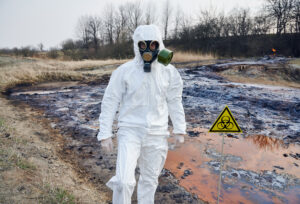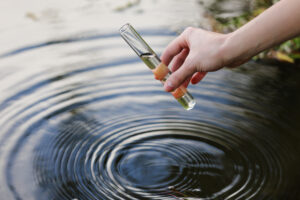Camp Lejeune Water Contamination Lawyers

The Camp Lejeune water contamination lawyers at Smith & Vanture may be able to help you file a claim for VA disability benefits or for benefits under the Camp Lejeune Justice Act if you served, worked, or lived at Camp Lejeune or MCAS New River for at least 30 consecutive days between August 1953 and December 1987 and were diagnosed with a medical condition known to be related to the water contamination that occurred at Camp Lejeune between these dates. Between August 1953 and December 1987, the Department of Veteran’s Affairs has admitted that water at Camp Lejeune and MCAS New River contained potentially toxic and harmful contaminants associated with a range of medical conditions and cancers. Conditions associated with water contamination at Camp Lejeune include:
- Adult Leukemia
- Aplastic Anemia
- Myelodysplastic Syndromes
- Bladder Cancer
- Kidney Cancer
- Liver Cancer
- Multiple Myeloma
- Non-Hodgkin’s Lymphoma
- Parkinson’s Disease
If you served for at least 30 consecutive days at Camp Lejeune or MCAS New River between August 1953 and December 1987 and were not dishonorably discharged, you may be entitled to receive VA disability benefits for medical conditions related to water contamination at Camp Lejeune. The VA has also agreed to provide cost-free care (including no copays) to Veterans, civilian workers, and family members who lived or worked at Camp Lejeune who also have the following conditions:
- Esophageal Cancer
- Breast Cancer
- Kidney Cancer
- Multiple Myeloma
- Renal Toxicity
- Female Infertility
- Scleroderma
- Non-Hodgkin’s Lymphoma
- Lung Cancer
- Bladder Cancer
- Leukemia
- Myelodysplastic Syndromes
- Hepatic Steatosis
- Miscarriage
- Neurobehavioral Effects
Furthermore, if you are a family member of a Veteran and you resided at Camp Lejeune for at least 30 days between the time of contamination, you may also qualify to have out-of-pocket medical costs reimbursed if you suffer from any of the 15 qualifying medical conditions known to be related to Camp Lejeune water contamination. People who were exposed to contaminated water in-utero may also qualify for benefits.
Camp Lejeune Water Contamination Lawsuit

The U.S. Department of Veterans Affairs has finally admitted that people living or working at Camp Lejeune were exposed to drinking water that contained volatile organic compounds. The water was found to be contaminated with industrial solvents, benzene, and other potentially dangerous chemicals. The main chemicals include a degreaser known as TCE, a dry-cleaning solvent known as PCE, benzene, and vinyl chloride, though other chemicals have also been identified. If you or someone you love has developed one of the conditions known to be connected to contaminated water at Camp Lejeune, you and your family may be entitled to seek benefits to cover your medical expenses. The Camp Lejeune water contamination lawsuit attorneys at Smith & Vanture may be able to help you and your family seek the benefits you might be entitled to receive. If a loved one passed away due to one of the listed benefits and your family suffered financial loss because of out-of-pocket medical expenses, you may be able to join a growing number of families suing for compensation to cover these losses.
How to Receive Camp Lejeune Water Contamination Lawsuit Benefits
If you lived or worked at Camp Lejeune or MCAS New River between August 1953 and December 1987 for at least 30 consecutive days, you may be able to receive coverage for any medical costs through the VA at no cost to you or your family. To file for disability compensation under the Camp Lejeune Justice Act, you’ll need to provide the following evidence to the Department of Veteran’s Affairs:
- Proof that you served at Camp Lejeune or MCAS New River between August 1953 and December 1987 for at least 30 days. This can include military records showing that you were on active duty, or in the National Guard.
- Medical records show that you have one of the 8 qualifying illnesses for disability benefits from the VA. The 8 illnesses are:
- Adult Leukemia
- Aplastic Anemia or Myelodysplastic Syndromes
- Bladder Cancer
- Kidney Cancer
- Liver Cancer
- Multiple Myeloma
- Non-Hodgkin’s Lymphoma
- Parkinson’s Disease
If you are a family member of a Veteran who served at Camp Lejeune or are a Veteran who served at Camp Lejeune between August 1953 and December 1987 for at least 30 consecutive days, you may also qualify for health care benefits and reimbursement for your out-of-pocket medical care. In order to qualify for these benefits, you’ll need:
- Proof of your relationship with the active-duty veteran (for example, a marriage license, birth certificate, or adoption certificate).
- Documentation that shows that you lived or worked at Camp Lejeune between August 1953 and December 1987 for at least 30 consecutive days. (Qualifying documentation can include utility bills, base housing records, military orders, or tax forms).
- Medical records that indicate that you have one of the 15 qualifying conditions. The 15 qualifying conditions include:
- Esophageal Cancer
- Breast Cancer
- Kidney Cancer
- Multiple Myeloma
- Renal Toxicity
- Female Infertility
- Scleroderma
- Non-Hodgkin’s Lymphoma
- Lung Cancer
- Bladder Cancer
- Leukemia
- Myelodysplastic Syndromes
- Hepatic Steatosis
- Miscarriage
- Neurobehavioral Effects
If you lived or worked on Camp Lejeune between January 1, 1957, and December 31, 1987, you can receive reimbursement for care received on or after August 6, 2012 and coverage for care received up to two years before you file for benefits; and if you lived or worked on Camp Lejeune between August 1, 1953, and December 31, 1956, you can receive reimbursement for care received on or after December 16, 2014 and coverage for care your have received up to two years before you filed for benefits.
The Camp Lejeune water contamination lawsuit attorneys at Smith & Vanture may be able to help you file a claim, appeal a denied claim, or pursue a lawsuit if you do not qualify for benefits under the Camp Lejeune Justice Act. Individuals who qualify for VA disability benefits or benefits under the Camp Lejeune Justice Act may have their lawsuit rejected and be referred to apply for benefits. Individuals who do not qualify for benefits under the Camp Lejeune Justice Act may be able to seek compensation by filing a lawsuit. The Camp Lejeune water contamination lawsuit attorneys at Smith & Vanture can review your situation and help you determine your best course forward.
How Many People Might Be Eligible for a Camp Lejeune Poison Water Lawsuit?

The Camp Lejeune Justice Act covers a long period of time (between August 1953 and December 1987). According to the Centers for Disease Control, as many as one million service members, civilian staff, and families living and working on base may have been exposed to contaminated water. Recent news reports show that only around 14,000 Veterans, civilian workers, and their families have filed for benefits under the Camp Lejeune Justice Act, and it is believed that more people might apply for benefits in the coming months and years. Some people may qualify for benefits and may not be aware that their medical condition is associated with contaminated water at Camp Lejeune.
If you developed any of the 15 medical conditions associated with the Camp Lejeune poison water lawsuit, you may be eligible to receive reimbursement for your medical expenses or receive medical care through the VA for your disability without the need for out-of-pocket costs. Contact the Camp Lejeune poison water lawsuit attorneys at Smith & Vanture today to learn more about your rights. You may be able to join a growing number of people who lived at Camp Lejeune and suffered health effects because of drinking or being exposed to contaminated water.
Understanding the Chemicals Discovered at Camp Lejeune in the Camp Lejeune Toxic Water Lawsuit
Several toxic chemicals have been specifically named as contaminating the water in Camp Lejeune, and another 70 chemicals have been identified. The main named chemicals found in the water include:
- Trichloroethylene (TCE)
- Perchloroethylene (PCE)
- Benzene
- Vinyl chloride
Other toxic substances that have been linked to Camp Lejeune include radioactive waste and other chemicals. According to the Agency for Toxic Substances and Disease Registry, not everyone who has been exposed to TCE, PCE, benzene, or vinyl chloride will develop an illness. Exposure to TCE has been linked to kidney cancer, non-Hodgkin’s lymphoma, heart issues, leukemia, liver cancer, multiple myeloma, end-stage renal disease, Parkinson’s disease, and scleroderma. Health conditions associated with exposure to PCE include bladder cancer, end-stage renal disease, and Non-Hodgkin’s lymphoma. Benzene exposure has been connected to leukemia and non-Hodgkin’s lymphoma, as well as multiple myeloma. Health effects associated with exposure to vinyl chloride include liver cancer.

These are not the only conditions that have been associated with these chemicals. According to the Agency for Toxic Substances Disease Registry, at least one study has linked PCE or TCE with the following conditions:
- Blocking of the nasal passages with bone or tissue
- Eye defects
- Low birth weight
- Birth defects
- Fetal death
- Miscarriage
- Neural tube defects
- Cleft palate
- Breast cancer
- Cervical cancer
- Low birth weight
- Esophageal cancer
- Lung cancer
- Ovarian cancer
- Prostate cancer
- Rectal cancer
- Impaired immune system
- Neurological effects
- Neurobehavioral effects
- Hypersensitivity skin disorder
Some of these conditions are not included among the 15 conditions listed under the Camp Lejeune Justice Act. Individuals who develop these conditions and believe their condition is linked to drinking contaminated water may still be able to pursue justice by filing a Camp Lejeune contaminated water lawsuit. Smith & Vanture is a Camp Lejeune contaminated water law firm that may be able to help you.
Yet, these four chemicals were not the only four toxic substances found in the water at Camp Lejeune. As many as 70 other toxic chemicals were found. Most alarmingly, these chemicals can have potential effects when combined. If you lived or worked at Camp Lejeune and developed a medical condition you believe to be linked with drinking or being exposed to contaminated water, you may be able to join a growing number of people pursuing a Camp Lejeune toxic water lawsuit. The Camp Lejeune toxic water attorneys at Smith & Vanture are here to help you if you believe that contaminated water at Camp Lejeune made you sick.
What are Neurological or Neurobehavioral Effects Linked to Camp Lejeune Water Contamination?
Neurobehavioral effects are listed among the 15 conditions covered under the Camp Lejeune Justice Act. Neurobehavioral effects can include a broad range of symptoms and complaints. According to the National Library of Medicine, neurobehavioral effects include:
- Fatigue
- Lack of coordination
- Confusion
- Depression
- Tension
- Trouble concentrating
- Headaches
- Problems with reaction time
- Problems with attention
- Coordination issues
- Sensory deficits (blindness or changes in vision, for example)
- Problems with motor function
- Certain learning or behavioral disorders
- Alzheimer’s disease or Parkinson’s
- Dementia
- Insomnia
- PTSD
- Suicide
- Motor difficulties (tremors, problems walking, weakness)
Neurobehavioral effects include a broad range of conditions. Because the term is so broad, individuals and family members exposed to contaminated water at Camp Lejeune may have developed one or several of these conditions and may not be aware that their medical condition could qualify them for benefits under the Camp Lejeune Justice Act. If you or someone you love was exposed to contaminated water because they lived, worked, or served at Camp Lejeune between August 1953 and December 1987 for at least 30 consecutive days, you may be entitled to receive compensation or reimbursement for your medical expenses and losses. The Camp Lejeune toxic water attorneys at Smith & Vanture are here to help you if you believe your medical condition was the result of drinking or being exposed to toxic water at Camp Lejeune. We can review your medical records and offer guidance on the next steps or assist you with filing a claim.
Contact a Camp Lejeune Water Contamination Lawsuit Lawyer Today

If you became sick after living, working, or serving at Camp Lejeune between August 1953 and December 1987 for at least 30 consecutive days, you may be able to join a growing number of people who are entitled to receive benefits under the Camp Lejeune Justice Act. Reports indicate that as many as one million servicemembers and their families and civilian workers may have been exposed to contaminated water during this time. Only about 14,000 claims have been made, but more claims are coming in daily, and these numbers are only expected to grow. Families may be able to seek justice either by filing a claim with the VA or by filing a lawsuit. The Camp Lejeune water contamination lawsuit lawyers at Smith & Vanture can review your case, review your medical conditions, and help you understand what your options are. Some individuals may be able to file a claim directly with the VA, while others may not qualify for these claims and may choose to pursue a Camp Lejeune water contamination lawsuit instead. If you have questions about your rights or what your next steps should be, reach out to Smith & Vanture a Camp Lejeune water contamination lawsuit law firm today. We are here to help. We only get paid if you win and we offer clients an initial consultation during which we can review your situation and offer guidance on the next steps.
